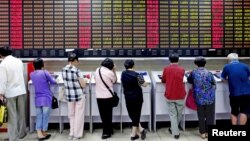Chinese stocks continued to tumble Wednesday, prompting Beijing to warn of a "panic sentiment" by investors and unveil a series of desperate new measures to stop the three-week slide.
Concern over the plunging Chinese stock values spread to the U.S., where major markets were off one percent in mid-day trading. But European stocks gained as investors held out hope the Greek debt crisis might be resolved after Greece promised to produce a detailed economic plan by Thursday.
In China, the benchmark Shanghai Composite Index closed down nearly 6 percent, while the Shenzhen Composite Index slid 2.5 percent, continuing a crash that has wiped out $3.2 trillion of market value since mid-June.
'Panic sentiment'
Trying to shield themselves from the sell-off, hundreds more Chinese companies filed for trading suspensions Wednesday. In total, over 1,300 mainland companies, at least 40 percent of the market, have halted trading.
A "panic sentiment" in the market and a rise in "irrational selling" was contributing to the slide, according to a statement by Beijing's stock regulator, the China Securities Regulatory Commission.
As part of a raft of new moves to prop up the market, a government agency that oversees the country's biggest state-run companies told them not to sell shares, but to buy more, "in order to safeguard market stability."
The central bank also pledged to "offer abundant liquidity supply for security brokers," while Beijing moved to allow insurance companies to invest larger amounts in stocks.
In recent days, Beijing has sought to encourage stock purchases by cutting key interest rates, reducing stock transaction fees and relaxing rules on how much money traders must deposit in order to buy stock.
Asian markets shaken
The economic turmoil in the world's second-largest economy, along with the Greek debt crisis, is rattling other Asian markets. Hong Kong closed down about 6 percent. Stocks in Tokyo and Taipei ended the day down about 3 percent.
China's stock market surged in late 2014 after the country's central bank cut interest rates for the first time in more than two years and launched a new trading link between the Shanghai and Hong Kong exchanges.
The rally was fueled by higher margin trading, in which investors do not have to deposit the full cost of their stock trades in order to buy the shares.
By June 12, Chinese stocks had soared more than 150 percent in a year-long advance.
But as the market peaked three weeks ago, the government tightened the rules on margin trading and investors started to sell their holdings and take their profits.
Now, with the markets falling, Beijing's central bank has intervened to try to limit the losses.
Cinda Securities strategist Chen Jiahe said the government's "main objective is to prevent share prices from slumping further amid a selling stampede."
But another analyst, Mark Williams of Capital Economics, said, "There is a good chance that the market rescue efforts are seen to be a failure in a few months' time."




